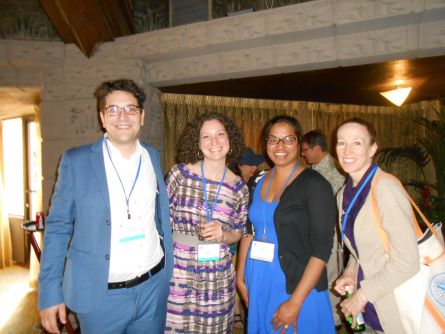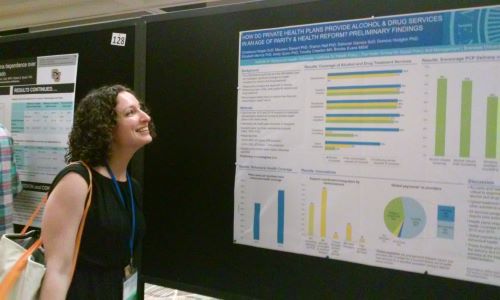RAMS Alumni Spotlight: Dr. Zoe Weinstein
 For our February 2024 RAMS Alumni Spotlight, we interviewed Dr. Zoe Weinstein, MD, MS, from the 3rd RAMS Cohort (2014-2016) about her background and work since completing the RAMS Program.
For our February 2024 RAMS Alumni Spotlight, we interviewed Dr. Zoe Weinstein, MD, MS, from the 3rd RAMS Cohort (2014-2016) about her background and work since completing the RAMS Program.
Zoe is an Assistant Professor at the Boston University Chobanian & Avedisian School of Medicine: Department of Medicine. She is a graduate of Boston University’s Addiction Medicine Fellowship and board certified in Internal Medicine and Addiction Medicine. She completed her medical degree at the University of California San Francisco, and residency at Boston Medical Center. She has been the Director of Boston Medical Center’s multidisciplinary addiction consult service since July 2016, serves as Associate Director of Boston University’s Addiction Medicine Fellowship Program, is a board member of AMERSA and is a site medical director of a local methadone clinic.
Read on to learn more about Zoe!
Tell us about your clinical and research background. What led you to study substance use?
I fell in love with clinical addiction care during residency by working with wonderful mentors such as Alex Walley and Christine Pace at the local methadone clinic, and Dan Alford in our Office Based Addiction Treatment (OBAT) program. I felt like I was so lucky to be part of these exceptional services, and also aware of how little we knew about the addiction care we were providing every day. During residency, I also was getting excited about developing research skills. Addiction fellowship was the perfect opportunity to grow my clinical skills and use my burgeoning research skills to evaluate OBAT. I was very lucky to have Jeffrey Samet offer to be my mentor, and the support of OBAT leaders like Colleen Labelle.
In what ways did your involvement with the RAMS Program assist you with your research career?
RAMS was such a special program. It was such a gift to be with a cohort of people who were at similar stages of their careers at institutions across the country. I feel like we grew up together as researchers. The coaching from senior mentors was of course awesome, but the peer network is what I cherish most. Senior mentors helped me navigate my first set of conferences, introduced me to other leaders in the field and helped shape my work. Every conference I go to now, is a mini RAMS reunion, seeing those from my cohort as well as before and after me. It is also a special joy to read, admire and cite all so many of those I knew back when we were all fellows.

Zoe (second from left) at the 2015 CPDD Conference.
Did you move institutions post-fellowship? If so, what was the most challenging about this transition?
I decided to stay at my current institution due the exceptional senior and peer mentorship, as well as building on my clinical and research opportunities, so it is even more important to me that I have RAMS colleagues across the country to help keep me from becoming too myopic.
What would you consider an interesting or surprising finding from your research so far?
Honestly, I enjoy writing papers and sharing results, but my favorite part of research is the new skills I gain in the process and the learning I get from my co-authors. Currently, I have one study I am leading which is mixed methods, and I have learned so much about qualitative work from my co-investigators, including a PhD student who used some of our data in her thesis. In another current study, we are using Medicaid data for the primary outcome. It is fascinating to get into the nitty gritty of the strengths and weaknesses of various types of data. I also have multiple studies where I have provided training and technical assistance to other clinicians who are starting up clinical programs. I think I am always surprised by how much bidirectional learning there is. These clinicians look to me as the expert, but I learn so much from them!

Zoe at the 2015 CPDD Conference.
Tell us about some directions you see your research going in.
I have focused my research mostly within clinical settings I work in, and my questions are often driven by that clinical experience. I am very excited to be doing more research on methadone treatment. It is one of the clinical spaces I enjoy most, but in many ways the care is outdated and not evidence-based. Methadone care is a space where research can be essential to advocacy efforts for care reform.
What has been a particularly challenging IRB issue you have had recently?
I honestly think my local IRB is great, though like everything I wish for a faster turnaround time. In the past few years, I have started working more in multisite studies where we have to cede single IRBs, so I am still learning the process of how to balance the needs and preferences of my local IRB and the single IRB.
Have you ever had an experience with a revise and resubmit decision and/or a rejection, and if so, what errors did you make and what would you have changed/what did you change?
I recently got a desk rejection from the editor which basically said: “Why should we care about this study? We don’t see what’s new or important here.” They were right, I had buried the Why. Just after the rejection I went to a great talk about research as an advocacy tool. One of the speakers said (paraphrase): “We want to use your research as advocacy, but you sometimes need to spell it out clearly for the pundits and politicians to make concise talking points”. All of this reminded me to be more assertive in my writing.
Tell us one thing about yourself that readers might find interesting.
I always enjoyed creative writing. I was co-editor of the literary magazine in high school and took creative writing classes in college. I still write poetry sometimes, especially to process challenging patient cases.
This interview was compiled and posted by Amanda Fitzpatrick, MPH.